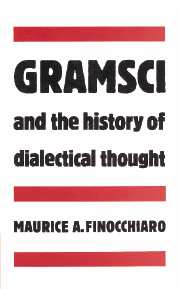Book contents
- Frontmatter
- Contents
- Preface and acknowledgments
- INTRODUCTION: AN APPROACH TO GRAMSCI
- Chapter 1 GRAMSCI'S CROCEAN CRITIQUE OF CROCE'S PHILOSOPHY
- Chapter 2 CROCE AND THE THEORY AND PRACTICE OF CRITICISM
- Chapter 3 GRAMSCI'S METHODOLOGICAL CRITICISM OF BUKHARIN'S SOCIOLOGY
- Chapter 4 BUKHARIN AND THE THEORY AND PRACTICE OF SCIENCE
- Chapter 5 GRAMSCI'S DIALECTICAL INTERPRETATION OF MACHIAVELLI'S POLITICS
- Chapter 6 GRAMSCI'S POLITICAL TRANSLATION OF HEGELIAN-MARXIAN DIALECTIC
- Chapter 7 HEGEL AND THE THEORY AND PRACTICE OF DIALECTIC
- Chapter 8 GRAMSCI AND THE EVALUATION OF MARXISM
- CONCLUSION: DIALECTICAL METHODOLOGY AND TEXTUAL CRITICISM
- Appendix: Concordance of critical edition and English translations
- Notes
- Bibliography
- Index
CONCLUSION: DIALECTICAL METHODOLOGY AND TEXTUAL CRITICISM
Published online by Cambridge University Press: 10 December 2009
- Frontmatter
- Contents
- Preface and acknowledgments
- INTRODUCTION: AN APPROACH TO GRAMSCI
- Chapter 1 GRAMSCI'S CROCEAN CRITIQUE OF CROCE'S PHILOSOPHY
- Chapter 2 CROCE AND THE THEORY AND PRACTICE OF CRITICISM
- Chapter 3 GRAMSCI'S METHODOLOGICAL CRITICISM OF BUKHARIN'S SOCIOLOGY
- Chapter 4 BUKHARIN AND THE THEORY AND PRACTICE OF SCIENCE
- Chapter 5 GRAMSCI'S DIALECTICAL INTERPRETATION OF MACHIAVELLI'S POLITICS
- Chapter 6 GRAMSCI'S POLITICAL TRANSLATION OF HEGELIAN-MARXIAN DIALECTIC
- Chapter 7 HEGEL AND THE THEORY AND PRACTICE OF DIALECTIC
- Chapter 8 GRAMSCI AND THE EVALUATION OF MARXISM
- CONCLUSION: DIALECTICAL METHODOLOGY AND TEXTUAL CRITICISM
- Appendix: Concordance of critical edition and English translations
- Notes
- Bibliography
- Index
Summary
The present investigation has given new depth to the question of the historical roots of Gramsci's thought. For we have seen that the influence of Croce can be demonstrated not only in the context of Gramsci's explicit attempt to come to terms with Croce's philosophy but also when Gramsci is trying to learn from other sources. Thus, on the one hand, the explicit “anti-Croce” turns out to a large extent to be the logical and methodological exercise of exploring the internal coherence of the corpus of Croce's doctrines and techniques, in particular his theories of religion, of philosophy, of history, and of politics; his style and method of criticism; and his liquidationist dismissal of Marxism. On the other hand, in the critique of Bukharin, although Gramsci makes a significant advance beyond Croce by formulating a sound conception of the nature of science, he does so not only while under the influence of Crocean antipositivism and antisociologism in general but also while applying the Crocean conception of philosophy and doctrine of the nature of prediction. Moreover, in the critique of Machiavelli, although it would be improper to deny Gramsci's originality vis-ávis Croce, it is clear he is elaborating the Crocean historical interpretation of Machiavelli as the Marx of Italian unification, and the Crocean intuition that the study of Machiavelli can lead to an analytical understanding of the nature of political activity.
- Type
- Chapter
- Information
- Gramsci and the History of Dialectical Thought , pp. 243 - 248Publisher: Cambridge University PressPrint publication year: 1989

